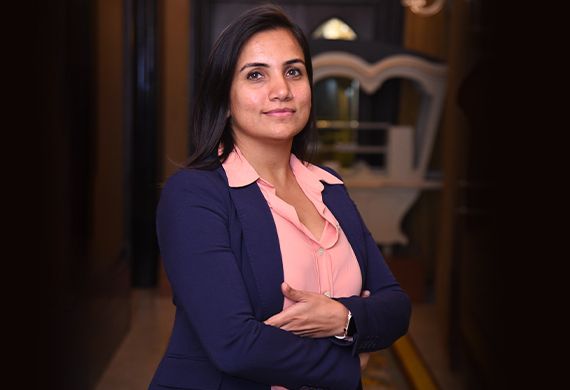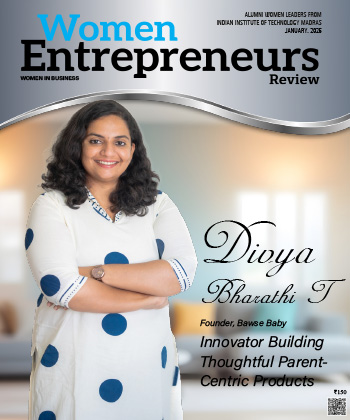
How Leaders Can Balance Risk & Innovation in Today's Banking Landscape
By: Charu Mathur, Head of Digital Banking & Strategy, IndusInd Bank
Charu Mathur, Head of Digital Banking & Strategy at IndusInd Bank, leads the bank's digital initiatives, driving innovation across platforms and enhancing customer experiences. Charu is passionate about building businesses from the ground up, solving complex business challenges, and leveraging customer insights to design impactful products and platforms that drive user growth.
In a recent conversation with the Women Entrepreneurs Review Magazine, Charu shares insights on the noticeable increase in women leadership across the ecosystem, highlighting the unique strengths they bring to the table such as customer empathy, creativity, diligence, and stability.
She talks about women’s evolving role in driving digital transformations in the banking world while also outlining the structural and cultural shifts required to support more women leaders. Additionally, Charu breaks down risk management and innovation in banking.
For more insights from Charu Mathur, read the article below.
How do you see leaders in digital banking today navigating the rapidly evolving landscape of digital-first business models, especially in the context of growing competition and market volatility?
Over the past five years, consumer behavior in banking has shifted significantly, with most customers now preferring fully digital experiences for services like savings accounts, payments, deposits, investments, loans, and credit cards. As a result, branch visits and call center usage have declined, and tech-led engagement has become the norm.
Digital adoption is also rising in the MSME segment for services like payments, lending and trade finance. Majorly, the innovation is driven by fintechs, not traditional banks, especially in areas like payments and wealth management.
Despite this, banks maintain a strong trust advantage with customers. To stay competitive, banks must become truly customer-centric and re-evaluate their capabilities, building in-house expertise in technology, data analytics, digital product design, and user experience, areas that have become essential for delivering fintech-level services.
In your experience, how has the role of women evolved in driving digital transformation in banking? What unique qualities do women bring to scaling digital-only business lines?
There are now significantly more women in leadership roles across the banking and fintech ecosystem, including regulators, banks, and tech providers. Women often bring a unique and differentiated approach to problem-solving, particularly when it comes to understanding customer needs and driving user growth.
Their empathetic perspective enables them to generate creative ideas and excel in areas like customer segmentation and campaign design. Additionally, women tend to show greater diligence, commitment, and stability, contributing to stronger continuity in teams and projects.
Banking thrives on risk management. How do you navigate resistance to digital-first strategies while championing transformation in a highly regulated and risk-conscious industry?
Driving new-age innovation in large, regulated institutions like banks is challenging, especially due to the strict requirements of risk management and compliance. However, success lies in deeply understanding the bank's fiduciary responsibility and embedding compliance into every aspect of product and process design.
Collaborating with control functions like risk, compliance, and legal, while being well-informed and data-driven, helps enable compliant innovation.
A 'comb-style' leadership approach, which combines broad functional understanding across various functions with the ability to dive deep when needed in specific areas, is effective.
Lastly, strong support from top leadership is critical, as meaningful change in such organizations must be driven from the top.
As a leader in digital banking, how do you balance aggressive business expansion with ethical, customer-centric, and inclusive transformation?
Ethics and customer centricity can coexist with profitability, especially when a business adopts a long-term perspective. Trust and reliability, consistently demonstrated, are what make brands iconic. A successful business should focus on solving real problems and creating value for both customers and stakeholders.
At the same time, maintaining financial prudence by monitoring cash flows and avoiding unsustainable growth models is essential. With these core principles in place, it's possible to build a business that is ethical, customer-focused, and profitable without compromising any of these values.
With digital reshaping of finance, what structural and cultural shifts are essential for ensuring more women lead critical transformations in banking and financial services?
Achieving gender equality in the workforce requires deep structural and cultural changes. Structurally, the pipeline of women must be strengthened from early education onwards, as underrepresentation starts well before the workplace. Companies should actively recruit women and adopt flexible policies for both men and women to support shared caregiving responsibilities.
Flexibility, such as paternity leave, helps women return to work more easily. Additionally, since women often hesitate to self-promote, leadership must ensure unbiased recognition of their contributions. Culturally, gender roles within households need to evolve, normalizing shared caregiving to enable both partners to pursue careers equally. While progress is visible in urban areas, broader societal change is essential.
Looking ahead, what innovative strategies or business models should women leaders champion to redefine the digital banking experience, especially for underserved customer segments like SMEs?
Adaptability is now a critical skill for everyone, regardless of gender, especially in a rapidly changing tech landscape. With advancements like generative AI, modern tech stacks, and the rise of the creator economy, continuous learning and evolving are essential for survival and success.
This adaptability also enables the creation of inclusive solutions for underserved segments, such as vernacular voice-enabled platforms and better payment solutions for MSME clients, which were once difficult or costly. Staying updated and open to change empowers individuals and businesses to better serve the ecosystem.
LAST WORD
Women should feel confident and comfortable in their skin, letting go of guilt and mental barriers. To truly unlock their full potential and contribute meaningfully to society and the economy, they must first believe in their equality. Empowerment begins with a mindset, women must see themselves as equal to truly achieve equality.
Most Viewed
- 1 Women's Health Startup HerMD Closing Doors Amid Industry Challenges
- 2 5 Famous Women in Indian Armed Forces
- 3 Saudi Women No longer Require Male Permission for Clothing Choices, says Prince MbS
- 4 Kolkata Medtech Startup Innovodigm Raises Rs 5.5 Crore Seed Funding Led by IAN Group
- 5 Yamunanagar's Kashish Kalra Honoured after Securing 111th Rank in UPSC Civil Services Exam
- 6 Madurai Appoints Its First Woman Corporation Head
- 7 IAS Vijayalakshmi Bidari Appointed as the new Nagpur Divisional Commissioner
- 8 American Entrepreneur Lucy Guo Overtakes T Swift to become Youngest Female Billionaire
- 9 ICC Women's World Cup 2025 Trophy Showcased at Indore's Holkar Stadium
- 10 Aparna Saxena's Beauty Venture AntiNorm Launches in India
- 11 Vidya Nataraj Co-Founded BlueStone Jewellery & Lifestyle files IPO
- 12 5 Women Freedom Fighters of India
- 13 Dr. G Krishnapriya appointed as CEO for Trichy
- 14 M3M & Sirona Partner to Introduce Menstrual Hygiene Vending Machines in 15 Locations
- 15 Punjab Govt launches SHE Cohort 3.0 Supporting Tech-led Women Startups
- 16 Indian origin Lawyer, Sweena Pannu appointed as the US New Superior Court Judge
- 17 The Aurora Tech Award recognizes 4 Indian Women-led Startups
- 18 Kerala's Republic Day parade featured an all-female tableau
- 19 Manisha Kabbur Becomes Karnataka's First Woman International Karate Coach
- 20 Director K. S. Ravikumar's Daughter Maalica Ravikumar Launches Life Coaching Company 'Evergrowth Academy' for Women
- 21 Leezu's Raises Pre-Seed Funding to Accelerate Growth in Sexual Wellness Industry
- 22 Sattu: Super-easy summer drink for PCOS gut healing
- 23 Swathi Nelabhatla creates Sitha App, India's First Women-Exclusive Gig Platform
- 24 7 Timeless Female Kathak Dancers & their Iconic Legacies
- 25 Meet 7 Iconic Women Architects of Modern India & their Most Impactful Work
- 26 This Woman-led Insuretech Startup is Helping Bridge the Education Financing Gap in India
- 27 Women Leaders Share Lessons Learnt from India Women's WC Win
- 28 5 Enterprising Women Founders Powering Singapore's Tech & Innovation Landscape
- 29 4 Women. 4 Stories. One Vision for Smarter, Stronger Healthcare
- 30 Global Gender Gap Narrows to 68.8%, But Full Equality 123 Years Away: WEF Report 2025
- 31 Changemakers: 7 Women Entrepreneurs Taking the Make in India Movement Forward
- 32 Meet Lucy Guo, The Youngest Self-Made Female Billionaire Disrupting Tech
- 33 How Women are Driving India's Festive Online Shopping Surge






